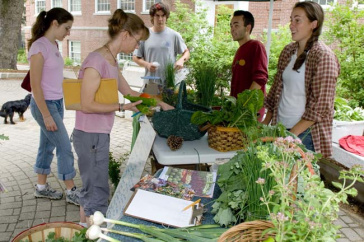Canadian Researcher Discusses 'Sea of Plenty' at UNH Feb. 23

University of New Hampshire students in the Organic Garden Club operate a weekly farm stand on campus. Credit: UNH Photographic Services
DURHAM, N.H. - Since ancient times, coastal people all around the world have used seafood as a major contribution to their diet, but until recently we did not know much about the environmental history of the sea. What does the past tell us, and is there really a "Sea of Plenty" in our future?
The University of New Hampshire 2010-2011 Saul O Sidore Memorial Lecture Series "Sea Stories for the Future: Interdisciplinary Conversations on Historic Oceans and Contemporary Marine Science" welcomes Heike Lotze, Canada Research Chair in Marine Renewable Resources, Dalhousie University, Halifax, Canada. Lotze will discuss "Sea of Plenty? Historical Trends, Current Issues, and Future Perspectives on Our Use of Seafood," from 4 to 5 p.m., Wednesday, Feb. 23, 2011, in the Memorial Union Building Theatre II. All lectures are free and open to the public.
According to Lotze, records of marine fishing, hunting, and harvesting dating back to more than 100,000 years ago show that the historical diet of coastal people included a wide range of species, from shellfish and fish to coastal birds, sea turtles, and marine mammals. Marine resources also were used for other purposes such as clothing, fuel, medicine, tools, and ornaments.
Until recently, however, researchers did not know much about the environmental history of the sea. Over the past decade, however, more researchers have dug deeper into the past, probing various sources of information to gain insight into the history of marine animal populations and ocean ecosystems.
Lotze will present examples from archaeological records, historical information, and modern data to outline the history of seafood use since ancient times, and how it has changed over past millennia and centuries. She will contrast our common vision of a "Sea of Plenty" with oceans that are full of fish and inexhaustible with early signs of overfishing found in archaeological and historical records.
Based on the long history of human influences on the sea, she will then provide an overview on the current state of the ocean's living resources, current issues in resource management and conservation, and future perspectives on our use of seafood. Finally, she will discuss what we can do for the recovery of marine species and the rebuilding of marine fisheries and ocean ecosystems to sustain plentiful seas in the future.
Lotze is a professor in marine biology at Dalhousie University, and holds the Canada Research Chair in Marine Renewable Resources. Trained in marine ecology and biological oceanography, she has a strong interest in how human activities alter marine populations and ocean ecosystems. In her research, she tries to reconstruct the long-term history of human-induced changes in the ocean, to disentangle the cumulative effects of multiple human activities, and to analyze the consequences of human-induced changes on the structure and functioning of marine ecosystems and the services they provide for human well-being.
The Saul O Sidore Memorial Lecture Series was established in 1965 in memory of Saul O Sidore of Manchester. The purpose of the series is to offer the University community and the state of New Hampshire programs that raise critical and sometimes controversial issues facing our society. For more information go to www.unh.edu/humanities-center or call 603-862-4356.
The University of New Hampshire, founded in 1866, is a world-class public research university with the feel of a New England liberal arts college. A land, sea, and space-grant university, UNH is the state's flagship public institution, enrolling 12,200 undergraduate and 2,300 graduate students.
PHOTO
Heike Lotze, Canada Research Chair in Marine Renewable Resources, Dalhousie University, Halifax, Canada
/unhtoday/sites/default/files/newsroom/img/Lotze.jpg
-30-
-
Media Contact
UNH Department of Decision Sciences | UNH Department of Decision Sciences | hongeng.zhou@unh.edu | 603-862-0869
Latest News
-
December 4, 2025
-
November 26, 2025
-
November 6, 2025
-
November 5, 2025
-
October 24, 2025














































